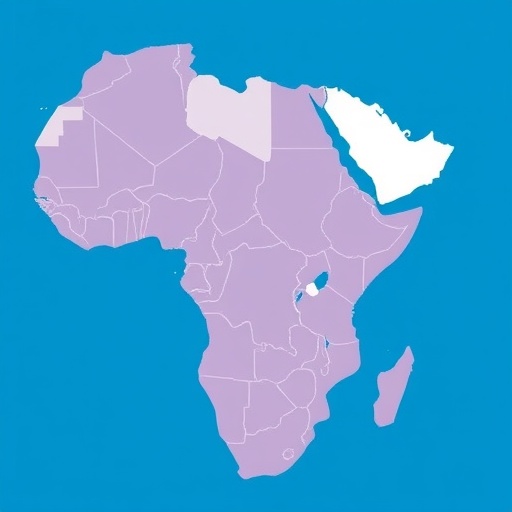HAMMAMET, TUNISIA — Amid a rapidly evolving landscape of cancer care, groundbreaking progress has emerged in Sub-Saharan Africa, marked by a significant decrease in inaccessible treatment options. This advancement was prominently highlighted at the African Organization for Research and Training in Cancer (AORTIC) conference held in Hammamet, Tunisia, where leading organizations including the National Comprehensive Cancer Network® (NCCN®), the African Cancer Coalition, and the American Cancer Society convened to unveil the latest strides in oncology guidelines tailored for the region. These efforts embody a concerted push toward bridging disparities in cancer treatment accessibility and quality, showcasing a new era of harmonized care protocols adapted for resource-constrained settings.
Since its inception in 2017, the NCCN Global Program, in collaboration with partner institutions, has relentlessly spearheaded initiatives to transform cancer care delivery across Sub-Saharan Africa. One of its foundational efforts involved the development of the NCCN Harmonized Guidelines™—a suite of evidence-based clinical practice guidelines meticulously designed for the unique healthcare realities faced by low- and middle-resource countries. These guidelines employ a nuanced color-coded schema, allowing providers to discern between aspirational standards of care and pragmatic options feasible under resource limitations, thus optimizing treatment strategies in heterogeneous clinical environments.
The NCCN Harmonized Guidelines™ represented a significant milestone by 2019, expanding to encompass comprehensive, expert consensus-driven recommendations for prevention, early detection, treatment, and supportive care for virtually all prevalent cancer types in the region. This comprehensive compilation underscored an integrative approach that accounted for prevalent oncological challenges, infrastructural constraints, and emergent therapeutic modalities, thereby setting a precedent for adaptive oncology protocols. The shift toward these guidelines marked a pivotal enhancement in clinical direction, offering a refined framework for sub-Saharan oncologists dedicated to improving patient outcomes through tailored and context-sensitive treatment pathways.
Recent developments herald an evolution from the initial harmonized guidelines to the current NCCN International Adaptations—regionally tailored resources aligned with global clinical standards while remaining acutely responsive to local constraints and needs. Presently, these adaptations encompass 57 distinct guideline sets specific to Sub-Saharan Africa, reflecting an in-depth synthesis of regional epidemiologic data, infrastructure capabilities, and therapeutic landscapes. This progression underscores an ongoing commitment to refine and contextualize cancer care recommendations, fostering equitable access to advanced diagnostics, biomarker testing, radiotherapy, and systemic therapies that were once largely unattainable.
An illuminating finding, presented by Katy Winckworth-Prejsnar, MPH, Global Program Director for NCCN, revealed that from 2017 to 2024, the proportion of inaccessible cancer treatment options in Sub-Saharan Africa plummeted dramatically—from a staggering 82% to a still concerning but encouraging 54%. This notable decline encapsulates substantial improvements in the availability and integration of crucial technologies including imaging modalities, molecular diagnostics, radiation treatments, and chemotherapeutic agents. Such enhancements reflect both policy interventions and grassroots initiatives aimed at scaling up oncology infrastructure and workforce capacity, demonstrating measurable impact on cancer care delivery paradigms.
The strategic collaboration among local clinicians, governmental bodies, and international organizations has been central to this transformation. The collective commitment has fostered an environment conducive to adopting novel technologies and therapeutics, while ensuring that guideline development resonates authentically with the challenges and opportunities inherent to Sub-Saharan healthcare settings. The NCCN Adaptations thus serve not only as clinical tools but also as catalysts for system-wide improvements, empowering healthcare providers to navigate practical hurdles with evidence-backed solutions adapted for real-world feasibility.
However, despite this substantial progress, significant gaps remain in oncology care access across Sub-Saharan Africa. Essential treatments and diagnostic capabilities continue to be fragmented or unavailable in many regions, undermining comprehensive cancer management efforts. The NCCN Adaptations, while foundational, represent the starting point for ongoing endeavors aiming to expand essential cancer care services, enhance health system resilience, and reduce outcome disparities in populations burdened by high cancer incidence and mortality rates.
Technically, the transition to NCCN International Adaptations involved rigorous methodology integrating multidisciplinary expert consensus, systematic literature reviews, and iterative stakeholder feedback mechanisms. This process ensured that guidelines were both evidence-based and pragmatically aligned with infrastructural and socioeconomic realities. Biomarker testing guidance, for instance, was calibrated to available laboratory capacities, while radiation therapy protocols were adjusted to the spectrum of equipment prevalent in regional oncology centers. Such precision ensures maximal clinical relevance and fosters practical implementation, ultimately enhancing patient care quality.
Moreover, digital platforms play a crucial role in disseminating these adaptations. The NCCN guidelines are accessible free of charge via their official website and dynamically integrated within the Virtual Library of NCCN Guidelines® App, fostering broad-based access among oncology professionals regardless of geographical constraints. This leveraging of technology facilitates continuous knowledge transfer and guideline updates, positioning the NCCN Global Program at the forefront of digital oncology education and resource distribution.
The implications of these developments are profound, signaling a paradigm shift towards harmonized, equitable cancer care on a continental scale. By prioritizing context-specific adaptations and sustainable implementation strategies, the collaborative efforts exemplify a scalable model for other low- and middle-income regions confronting similar healthcare disparities. The journey from daunting inaccessibility statistics toward incremental yet meaningful improvements sets a new benchmark for global oncology collaboration, reiterating the imperative for sustained investment, policy advocacy, and capacity building.
In summary, the NCCN Global Program’s leadership in crafting and evolving oncology guidelines for Sub-Saharan Africa has resulted in measurable expansion of treatment access, reduction in care disparities, and empowerment of regional oncology ecosystems. While challenges persist, the transition to NCCN International Adaptations affirms a forward momentum in elevating cancer care quality and accessibility. Continued partnership engagement, technology integration, and evidence-informed policy remain essential to ensuring that all patients across Sub-Saharan Africa receive life-saving cancer care grounded in globally recognized standards yet tailored to local realities.
Subject of Research: Cancer treatment access and guideline adaptation in Sub-Saharan Africa
Article Title: Transforming Cancer Care Access in Sub-Saharan Africa: Progress and Prospects through NCCN International Adaptations
News Publication Date: November 4, 2025
Web References:
– https://www.nccn.org/global/what-we-do
– https://aorticconference.org/
– https://www.nccn.org/global/what-we-do/international-adaptations
References: Not explicitly listed in the original content
Image Credits: NCCN
Keywords: Cancer, Diseases and disorders, Cancer policy, Cancer treatments, Oncology, Africa, International cooperation




